 Petzlover
Petzlover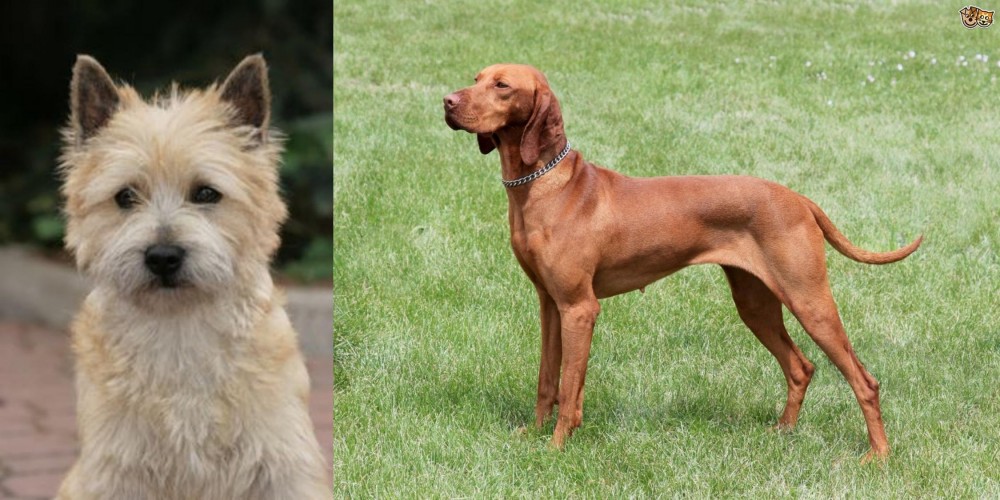 Cairn Terrier is originated from United Kingdom but Hungarian Vizsla is originated from Hungary. Cairn Terrier may grow 31 cm / 12 inches shorter than Hungarian Vizsla. Cairn Terrier may weigh 22 kg / 48 pounds lesser than Hungarian Vizsla. Cairn Terrier may live 5 years more than Hungarian Vizsla. Both Cairn Terrier and Hungarian Vizsla has almost same litter size. Both Cairn Terrier and Hungarian Vizsla requires Low Maintenance.
Cairn Terrier is originated from United Kingdom but Hungarian Vizsla is originated from Hungary. Cairn Terrier may grow 31 cm / 12 inches shorter than Hungarian Vizsla. Cairn Terrier may weigh 22 kg / 48 pounds lesser than Hungarian Vizsla. Cairn Terrier may live 5 years more than Hungarian Vizsla. Both Cairn Terrier and Hungarian Vizsla has almost same litter size. Both Cairn Terrier and Hungarian Vizsla requires Low Maintenance.
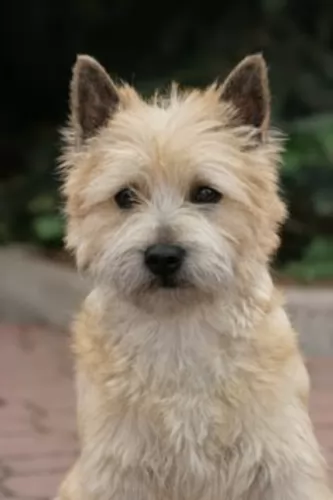 The Cairn Terrier originates in the Scottish Highlands. This feisty little dog was given the name Cairn, as he used to hunt prey between the Scottish cairns. At first the dog was grouped as a ‘Skye Terrier’way back in the 1900s with the Scottish and West Highland White Terrier. Then the different breeds began to be bred separately.
The Cairn Terrier originates in the Scottish Highlands. This feisty little dog was given the name Cairn, as he used to hunt prey between the Scottish cairns. At first the dog was grouped as a ‘Skye Terrier’way back in the 1900s with the Scottish and West Highland White Terrier. Then the different breeds began to be bred separately.
The name Cairn Terrier didn’t appear in print till 1887. It was in 1912 that the Kennel Club of the United Kingdom recognized the Cairn Terrier.
 The Hungarian Vizslas existed in the land that is now Hungary, the Pannonian Basin, at least since the 10th century when they were shown on etchings. It is thought that their descendants were various pointers, the extinct Turkish Yellow Dog and the Transylvanian Hound. The Vizsla is a hunting dog with the word being Hungarian for pointer. In 1937 the Carmelite Friars under orders from King Louis I of Hungry. The breed was isolated for centuries in the Basin by the aristocracy and land owners.
The Hungarian Vizslas existed in the land that is now Hungary, the Pannonian Basin, at least since the 10th century when they were shown on etchings. It is thought that their descendants were various pointers, the extinct Turkish Yellow Dog and the Transylvanian Hound. The Vizsla is a hunting dog with the word being Hungarian for pointer. In 1937 the Carmelite Friars under orders from King Louis I of Hungry. The breed was isolated for centuries in the Basin by the aristocracy and land owners.
The Magyar people of the area developed the breed for hunting as both pointers and retrievers. They were excellent at hunting rabbits and water fowl. With a terrific sense of smell and boundless stamina and energy, the were prized as family and companion dogs as well. This was unusual for a hunting or working dog. Their size made them appealing as well. They were small by comparison to other hunting dogs both pointers and retrievers.
Easy to train, the Hungarian Vizsla works in water, forests and fields. They are able to retrieve in the water as well as on the land. Throughout their history, the breed outlasted the Turkish Revolution, the Hungarian Revolution World War 1 and World War 2, as well as the Hungarian People’s Republic Communist State. Things were a little dicey for the Vizlas several times beginning in the 1800’s when German Shorthaired Pointers and English Pointers were introduced into the area. The next time was after World War II. Fearful of what this Communist state would mean for the breed, some were smuggled into the United States and Austria.
At that time there were only a dozen or so Vizslas in all of Hungary. Their numbers were brought back from that small breeding stock. This history did result in several different strains grew into their own breeding stock. There are Vizslas in Czechoslovakia, Romania, Serbia and Austria. There developed separate lines that became separate breeds in the Wirehaired Vizsla and the longhaired Vizsla which is very rare.
After World War II, the Hungarian Vizsla came to the United States and the Vizsla Club of American was established as a first step toward AKC (American Kennel Club) recognition. This was attained in 1960. Rex del Geisimino came to the U.S. in 1951 and he was able to respond to commands in both German and Hungarian. Vizslas also came to the United Kingdom in this time frame. There are now about 4500 registered with the KC (Kennel Club of Great Britain). A Vizsla won the distinctive Crufts Dog Show in Great Britain, as Best in Show.
It is believed that this gentle, sensitive and affectionate hunter was part of the original breeding stock or the Wirehaired Vizsla, the Weimaraner and the German Shorthaired Pointers. The Hungarian Vizsla is intelligent and social. The need your attention as well as a lot of exercise to avoid destructive behavior born of boredom. They want to be with you and they can be very protective of you.
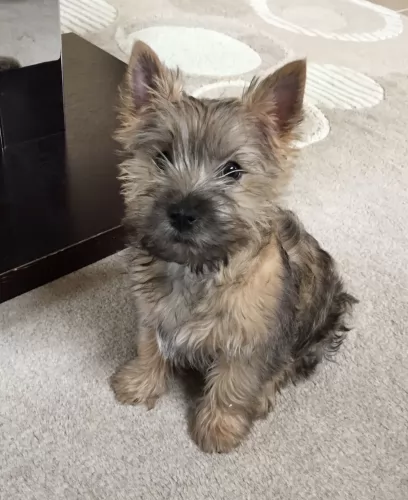 The small sturdily built working Terrier is intelligent and courageous. Bright-eyed, he is small and active and he just loves to work- and party hard with his human family. You’ll see if you’ve got a ball you want to throw for him, his tail is quivering in anticipation and his ears are erect and alert to any noise. He is smart, independent and courageous.
The small sturdily built working Terrier is intelligent and courageous. Bright-eyed, he is small and active and he just loves to work- and party hard with his human family. You’ll see if you’ve got a ball you want to throw for him, his tail is quivering in anticipation and his ears are erect and alert to any noise. He is smart, independent and courageous.
The Cairn Terrier has a tough, weather-resistant coat that can be any color but not white. He has a waterproof double coat – the outer one being wiry while the undercoat is soft. You’ll find the coat in man colours such as grey, black, red and brindle with dark points on the ears and muzzle.
The interesting thing with a Cairn is that when you get a puppy, you can’t be sure what color he will end up being as it changes over the years. The ears are fox-like, small and erect, and the natural medium-to-short tail is held straight out.
 The Hungarian Vizsla has a light build, a short coat, and a distinctive bearing. They are medium in size and muscular, lean dogs looking a lot like the Weimaraner. They are also close in appearance to the Rhodesian Ridgeback and the Redbone Coonhounds. They are more muscular and leaner than the Rhodesian Ridgeback and Weimaraner.
The Hungarian Vizsla has a light build, a short coat, and a distinctive bearing. They are medium in size and muscular, lean dogs looking a lot like the Weimaraner. They are also close in appearance to the Rhodesian Ridgeback and the Redbone Coonhounds. They are more muscular and leaner than the Rhodesian Ridgeback and Weimaraner.
The Vizsla has a reddish nose and their nails and eyes should also be reddish or blending with the color of their coat. They have docked tails in the American standard but not in the United Kingdom, as docking is banned there. If he has a tail, you can see it flying through the air as he runs through the rough land to retrieve fowl.
They have a domed skull with a tapered muzzle that is shorter or equal to the skull. They have eyes that are contrasted with the coat and of medium size. The ears of silky, hang close to the face and the tips are rounded. The coat is rust in color with many shades. He also has a deep chest and hound like face.
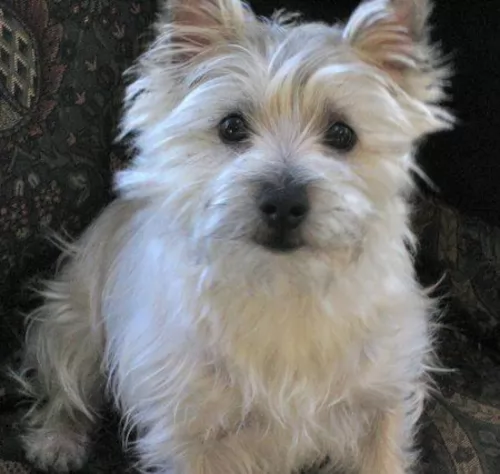 The Cairn Terrier is a fearless, jaunty little dog, known for his courageous spirit and inquisitive nature. He may be small, but he is stubborn. He will respond well to training and socialization which will turn him into the most awesome pet for families. He can make a wonderful friend and playmate for children too. Socialization and training ensures he gets on well with other pets in the household too.
The Cairn Terrier is a fearless, jaunty little dog, known for his courageous spirit and inquisitive nature. He may be small, but he is stubborn. He will respond well to training and socialization which will turn him into the most awesome pet for families. He can make a wonderful friend and playmate for children too. Socialization and training ensures he gets on well with other pets in the household too.
He is small and energetic, and therefore not the kind of dog you can ignore in terms of exercise. He’ll need a good walk every day and he just loves to chase a ball as it takes him back to the days when he was used to chasing- and catching mice.
He isn’t your typical lap-dog at all and with the right care he becomes a devoted, loyal and loving companion.
 Children friendliness - The Vizsla is very good with children.
Children friendliness - The Vizsla is very good with children.
Special talents - They are both excellent pointers and retrievers.
Adaptability - They are not very adaptable in living arrangements as they are much more suited for the country than the city.
Learning ability – The Vizsla is a very intelligent breed and easy to train. His learning ability is very high.
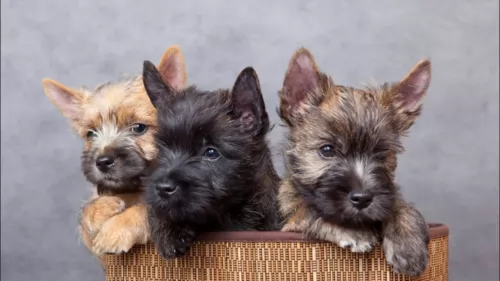 The Cairn Terrier is a robust little dog, and with good care can reach 14 years of age and even older. However, with every dog breed there are some health concerns particular to that breed. With your Cairn Terrier look out for a disease known as Globoid cell leukodystrophy (GCL).
The Cairn Terrier is a robust little dog, and with good care can reach 14 years of age and even older. However, with every dog breed there are some health concerns particular to that breed. With your Cairn Terrier look out for a disease known as Globoid cell leukodystrophy (GCL).
Known also as Krabbe Disease, Globoid cell leukodystrophy (GLD) is a rare but fatal disease. It is caused by a mutation on the dog’s DNA. There is abnormal processing of an enzyme needed for the production of myelin, a substance that protects the nerves in the brain and spinal cord. The dog is weak, it has tremors and isn’t co-ordinated. The Cairn Terrier is a breed of dog more susceptible to GCL.
Your Cairn Terrier may well suffer with joint diseases. These diseases, such as luxating patella which is about loose knee joints, and hip dysplasia which is a degenerative hip disease, can cause plenty of pain and discomfort for your pet.
Glaucoma is an eye disease where there is pressure on the eye, causing inadequate fluid drainage. Without treatment, there can be damage to the optic nerve which can lead to blindness.
 The Hungarian Vizsla has a series of health issues that include:
The Hungarian Vizsla has a series of health issues that include:
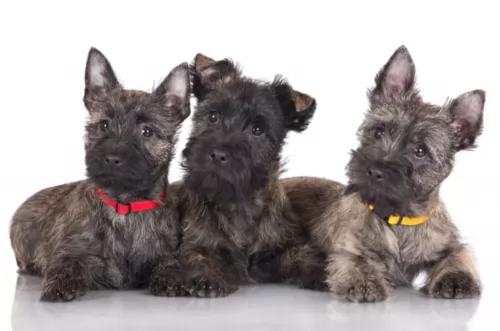 The Cairn Terrier sheds very little and the coat is easy to groom. Give him a thorough brushing twice a week to rid him of loose hairs. Some trimming will be needed as the coat can become shaggy and unruly.
The Cairn Terrier sheds very little and the coat is easy to groom. Give him a thorough brushing twice a week to rid him of loose hairs. Some trimming will be needed as the coat can become shaggy and unruly.
Brush his teeth at least 2 or 3 times a week to prevent tartar build up that can lead to bacteria, gum disease and possible tooth loss.
The Cairn Terrier is small but he is an active dog and therefore needs to be on a high-quality dog food. If you feed him a commercially manufactured food, make sure its appropriate to his age, size and activity levels.
He is a small dog so you want to be careful about not letting him become overweight. Try and alternate his commercially manufactured food with some home-made rice, vegetables and meat and also include some raw meat in from time to time. This is of particular importance as chronic skin allergies are common in all terrier breeds. Make sure that there is always a clean bowl of fresh water available to him day and night.
 Feed two to four cups per day of a high quality dry dog food. Break this up into three or four meals. Don’t free feed your puppy.
Feed two to four cups per day of a high quality dry dog food. Break this up into three or four meals. Don’t free feed your puppy.
Feed two to three cups per day of high quality dry dog food. Feed in two servings.
The Vizsla is an athlete with high energy.
The Hungarian Vizsla needs at least 30 minutes of exercise every day and maybe more. He needs a large yard or open field, but daily brisk walks will do if that is all that is possible. He needs to be stimulated intellectually as well and enjoys fetch, jogging with you, lure coursing, field trials, tracking and scent work, confirmation, agility, barn hunt, dock diving, rally, and obedience.